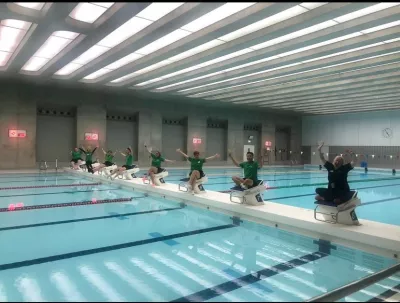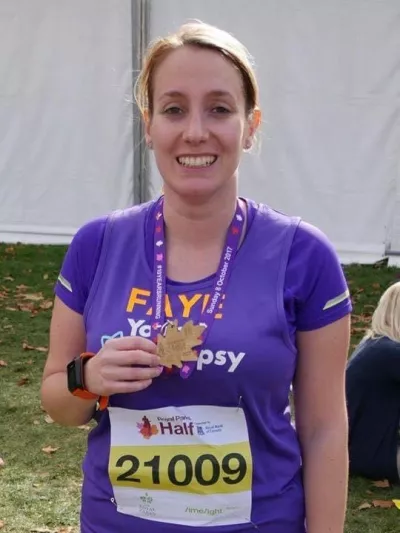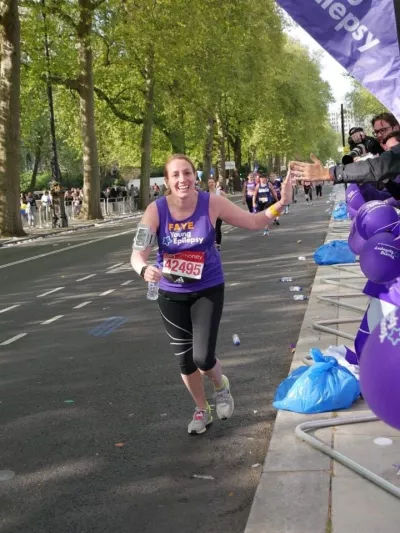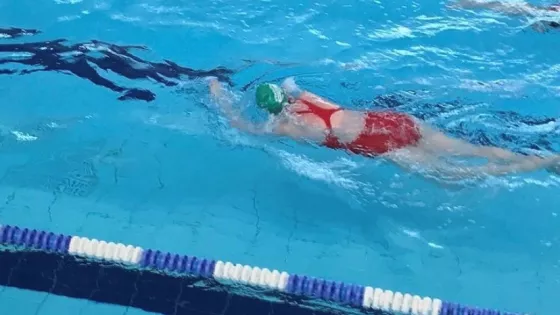Epilepsy and exercise: for me there is no doubt that exercise would help those with epilepsy. If not in the sense it would control seizures it could help mental health.
I have always been active but one area of my life that has always kept me sane is swimming. I was 7 years old when I was diagnosed with epilepsy. When I was diagnosed in 1993 the advice was pretty much to stop anything that would be considered dangerous. I shouldn’t swim, don't have baths etc. However I was already a strong swimmer, and I was very fortunate that I had a swim teacher who was willing to find a way for me to be able to continue swimming. It was one of the most important moments of my life.
As I struggled to get used to life with epilepsy, swimming was my saviour. When I felt I had no control over anything else I’d climb into the water and I felt strong and confident.Faye
At the time I didn’t realise that it was benefitting my mental health - I was only 7! I went on to swim for a club all through my teens, I would be in the pool 7 days a week. I didn't realise what it was doing for me, but with hindsight it made me feel like me. I was on an even platform to my peers.
I continued to swim through university and then for leisure and fitness in my adult life. It was after I had my little boy and I wanted a career change my Mum suggested I retrain as a swim Instructor; my seizures were better controlled and it was at least worth looking into.... The rest as they say is history. I am now fortunate to teach at The London Aquatics Centre in Stratford several days a week with the most supportive team and boss I could ask for. My own history makes me passionate about making swimming inclusive for everyone and I get real job satisfaction from seeing childrens’ confidence grow in the water.

If you are reading this as a parent of a child with epilepsy then what I would say to you is that my Mum overcoming her own fears to allow me to continue swimming was one of the best decisions she made for me. If you have fears, speak to your child's swim teacher (or coach in another sport), or whomever is in the water with your child. I had a special signal with my own childhood swim teacher, so she would know I felt a seizure beginning. It really gave me the confidence and also helped me come to terms with my own diagnosis. From a more practical point of view moving about in the water also helped loosen those stiff and sore joints after tonic clonic seizures.
As I have grown up I have seen the further benefits of exercise when you have epilepsy. It is widely documented that I have completed five marathons. I find running a challenge but one I enjoy (even if I never seem to get any better at it!) However when I am running I find my sleeping patterns become better which means I am less at risk of a seizure as sleep deprivation is a trigger for me. It is a win win in that situation, I am getting fitter and also helping myself to avoid triggers. However you may have set backs; whilst running Royal Parks Half Marathon 2017 for Young Epilepsy I had a seizure, it scared me and for a long while I didn't want to run again, but getting back out there gave me confidence. I used an app that allowed my family to trace my route and would notify them if I stopped moving, I ran with others where possible. In October 2018 I went back and faced my demons at the Royal Parks Half Marathon, finishing in the pouring rain with the biggest smile on my face. The battle isn’t always physical!

If going out for a run, swim or bike ride isn’t your thing there is plenty you can do at home. I am currently a big fan of Joe Wicks HITT workouts, the benefits for me being Noah can join in with me. They are also good for the days I feel a bit wobbly and not confident to go out alone but want to do something. I am in the comfort of my own home and get a good workout in. I also love doing Yoga on youtube. I am really seeing the benefits on my mind and body, even if I only manage a quick ten minute work out or walk I see my mood improve and I feel better, again as mentioned before it also helps with my sleep patterns, another added benefit is stress relief (again stress being a huge trigger) a brisk walk, run or swim and soon the weight of the world feels like it has been lifted. It really has been instrumental in helping me manage my seizure triggers.
The biggest thing for any sport is listen to your body, ease yourself into your sport and enjoy it. It is a challenge for yourself , don't compete with anyone else, as I said before I never really got any better at running because I did find the marathon training gruelling but it allowed me a confidence and a freedom especially once I had completed them
The key to exercise is to do whatever is right for you, for some it may be a marathon, for others it may be a walk around the block. Start with where you are comfortable and you can only improve from there.
For me exercise gives me a sense of freedom and purpose and I am not just talking about running marathons. When my seizures have been at their worst I have been scared to go out alone, so even a brisk walk with a loved one or friend made all the difference, I may not have been breaking any records but I was benefiting my own physical and mental health, it is all about your personal marathon, the mountain you have to climb.

My Top Tips:
- Listen to your body! You know your epilepsy best.
- EIther exercise with someone or inform them of your plans. (ie tell a lifeguard you have epilepsy)
- Stay hydrated.
- Carry ID and details of medical condition where possible.
- Set realistic goals - it isn’t all about running a marathon or climbing a mountain.
- The days you don't feel like working out or going for a walk are likely to be the days your mental health needs it most!
- Most importantly: Have Fun!
Will you help a child being unfairly left out?
Right now, children and young people are being excluded from the activities they love simply because they have epilepsy.
There’s two great ways that you can help! Donate today or join the £100 Challenge. Run, walk, bake or raise £100 your way. All donations and fundraising will be automatically doubled!


